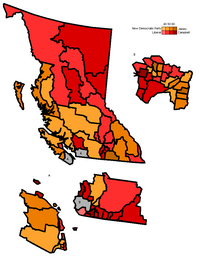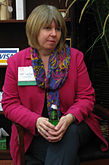British Columbia general election, 2005
|
|
|||||||||||||||||||||||||||||||||||||||||||||||||
|---|---|---|---|---|---|---|---|---|---|---|---|---|---|---|---|---|---|---|---|---|---|---|---|---|---|---|---|---|---|---|---|---|---|---|---|---|---|---|---|---|---|---|---|---|---|---|---|---|---|
|
|||||||||||||||||||||||||||||||||||||||||||||||||
|
79 seats of the Legislative Assembly of British Columbia 40 seats were needed for a majority |
|||||||||||||||||||||||||||||||||||||||||||||||||
|
|||||||||||||||||||||||||||||||||||||||||||||||||

Popular vote map by riding. Traditional areas of NDP support returned to the party fold after the preceding wipeout.
|
|||||||||||||||||||||||||||||||||||||||||||||||||
|
|||||||||||||||||||||||||||||||||||||||||||||||||
The 38th British Columbia general election was held on May 17, 2005, to elect members of the Legislative Assembly (MLAs) of the Province of British Columbia (BC), Canada. The British Columbia Liberal Party (BC Liberals) formed the government of the province prior to this general election under the leadership of Premier Gordon Campbell. The main opposition was the British Columbia New Democratic Party (BC NDP), whose electoral representation has been reduced to two MLAs in the previous provincial election in 2001.
The BC Liberals retained power, with a reduced majority of 46 out of 79 seats, down from the record 77 out of 79 in 2001. Voter turnout was 58.2 per cent.
Under amendments to the BC Constitution Act passed in 2001, BC elections are now held on fixed dates: the second Tuesday in May every four years. This was the first provincial election for which elector data in the provincial elector list was synchronised with the National Register of Electors.
The BC electoral reform referendum was held in conjunction with this election. This referendum asked voters whether or not they support the proposed electoral reforms of the Citizens' Assembly on Electoral Reform, which included switching to a single transferable vote (STV) system. Had it been approved by 60% of voters in 60% of ridings), the new electoral system would have been implemented for the general election in 2009. Although the proposed reform attracted a clear majority (58% of the popular vote in favour, with 77 out of 79 ridings showing majority support), the level of support was just short of that required for mandatory implementation. A new vote on a revamped version of STV was held in conjunction with the 2009 British Columbia general election.
...
Wikipedia



